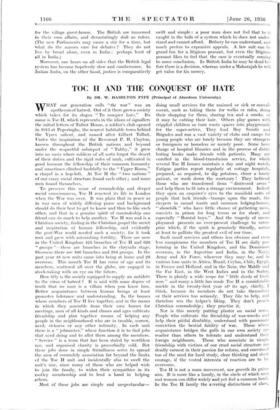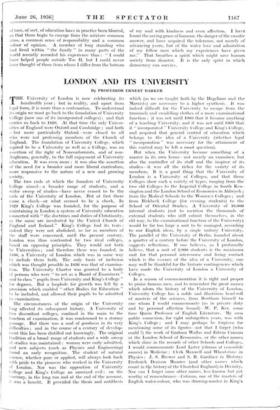TOC H AND THE CONQUEST OF HATE
By DR. W. HAMILTON FYFE (Principal of Aberdeen University)
WHAT our generation calls "the war" was an apotheosis of hatred. Out of it there grew a society which takes for its slogan " To conquer hate." Its name is Toc II, which represents in the idiom of signallers the initial letters of Talbot House, a soldier's club opened in 1915 at Poperinghe, the nearest habitable town behind the Ypres salient, and named after Gilbert Talbot. Under the inspiration of the Reverend P. B. Clayton, known throughout the British nations and beyond under the respectful sobriquet of " Tubby," it grew into an oasis where soldiers of all sorts forgot the desert of their duties and the rigid rules of rank, cultivated in good humour the fellowship of their common humanity and sometimes climbed bashfully to the " Upper Room," a chapel in a hop-loft. At Toe H the " two nations " of our crazy social structure found each other ; and some men found themselves.
To preserve this sense of comradeship and deeper social consciousness, Toc H renewed its life in London when the War was over. It was plain that in peace as in war men of widely differing purse and background 'should do their best to get to know and thus to like each other, and that in a genuine spirit of comradeship one friend can do much to help another. Toe H was and is a Christian society, finding in the Christian gospel the secret and inspiration of human fellowship, and evidently the post-War world needed such a society, for it took root and grew with astonishing fertility. There are now in the United Kingdom 425 branches of Toe H and 620 " groups "—these arc branches in the chrysalis stage. Overseas there are 106 branches and 284 groups. In the past year 48 new units came into being at home and 28 overseas. This month Toe II has come of age and its members, scattered all over the globe, are engaged in stock-taking with an eye on the future.
How fitly is the society equipped to supply an antidote to the virus of hatred ? It is said with some degree of truth that no man is a villain when you know him. Better acquaintance between human beings at least promotes tolerance and understanding. In the houses where members of Toe H live together, and in the rooms in which they assemble from their' own homes for meetings, men of all kinds and classes and ages cultivate friendship and plan together means of helping any people in the neighbourhood who are in trouble, sorrow, need, sickness or any other infirmity. In each unit there is a " jobmaster," whose function it is to find jobs that need doing and to allot them among the members. " Service " is a term that has been staled by worthless use, and organised charity is proverbially cold. But these jobs done in simple friendliness serve to spread the area of comradely association far beyond the limits cf the Toc H unit and incidentally also to swell the unit's size, since many of those who are helped wish to join the family, to widen their sympathies in its motley membership and to lend a hand in helping others.
Most of these jobs are simple and unspectacular— doing small services for the maimed or sick or conval- escent, such as taking them for walks or rides, doing their shopping for them, sharing tea and a smoke, or it may be cutting their hair. Others play games with crippled children or turn waste spaces into playgrounds for the super-active. They lead Boy Scouts and Brigades and run a vast, variety of clubs and camps for young people who are lonely because they arc strangers or foreigners or homeless or merely poor. Some have charge of hospital libraries and in the process of distri- buting books make friends with patients. Many are enrolled in the blood-transfusion service, for which several Toe H houses maintain a day and night watch. Fatigue parties report regularly at cottage hospitals, prepared, as required, to dig potatoes, cheer a lonely patient, or wash down the mortuary ! They befriend those who are transferred from " distressed areas " and help them to fit into a strange environment. Indeed they open an enquirer's eyes to the manifold sorts of people that lack friends—tramps upon the roads, the sleepers in casual wards and common lodging-houses, " showfolk " who have little chance of gathering Moss, convicts in prison for long terms or for short, and especially " Borstal boys." And the tragedy of unem- ployment presents an ever-present challenge to enter- prise which, if the spirit is genuinely friendly, serves at least to palliate the greatest evil of our time.
Such small services and others less obvious and even less conspicuous the members of Toc H are daily per- forming in the United Kingdom, and the Dominions overseas, in the Argentine and India, in the Navy, Army and Air Force, wherever they may be, and in various lone units in Africa, Brazil, Ceylon, Chile, Egypt, in France and Holland, and in the Near, the Middle and the Far East, in • the West Indies and in the Sudan. There is plainly a wide scope for " little deeds of kind- ness " and many a little has made Toc H a considerable mickle in the twenty-first year of its age, chiefly, think, because its members do not take themselves or their services too seriously. They like to help, and therefore win the helpee's liking. They don't preach Christian comradeship ; they practise it.
Nor is this merely putting plaster on social sores. People who cultivate the friendship of war-wrecks and help their pitiful disability, understand with passionate conviction the bestial futility of war. Those whose acquaintance bridges the gulfs in our own society are readier than others to tolerate and understand their foreign neighbours. Those who associate in simple friendship with victims of our cruel social structure are deadly earnest in their passion for reform, and convinced too of the need for hard study, clear thinking and stout courage, if the vested interests of reaction are to he overcome.
Tcc H is not a mass movement, nor growth its prime aim. It is more like a family, in the circle of which men and women can differ widely and yet feel a common bond. In the Toe H family the severing distinctions of class, of race, of sect, of education have in practice been blurred, so that there begin to emerge from the mixture common aims, a common sense of responsibility and a common colour of opinion. A member of long standing who had lived within " the family '.' in many parts of the world recently recorded his experience thus : " I could have helped people outside Toe II, but I could never have thought of those from whom I differ from the bottom of my soul with kindness and even affection. I have learnt, the saving grace of humour, the danger of the caustic answer, and have acquired the tolerance, not merely of advancing years, but of the wider love and admiration of my fellow men which my experiences have given me." That breathes a spirit which might save human society from disaster. It is the only spirit in which democracy can survive.











































 Previous page
Previous page